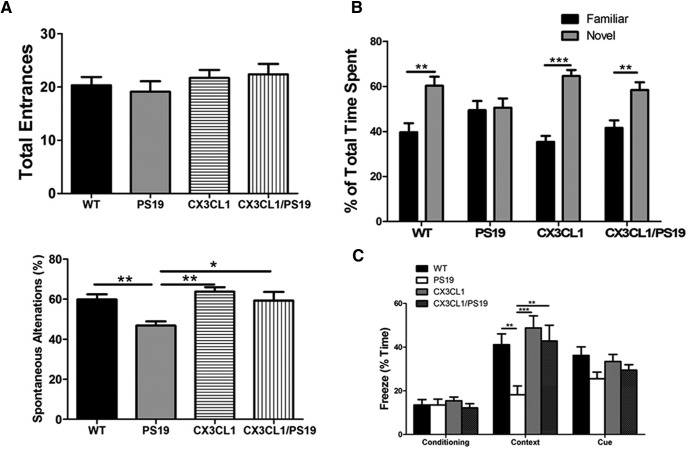Figure 7.
Increased learning and memory in Tg-CX3CL1/PS19 mice. A, A Y-maze test was conducted to assess spatial learning memory, and PS19 mice showed a clear reduction in spontaneous alternations, while this reduction was reversed in Tg-CX3CL1/PS19 mice. Total arm entrances on the Y-maze did not differ among the different genotypes of mice. B, A novel object recognition test was conducted to assess recognition memory. PS19 mice showed no discrimination between novel and familiar objects on the test, and this impairment was reversed by overexpression of CX3CL1 in Tg-CX3CL1/PS19 mice. C, A contextual fear-conditioning test was performed to assess hippocampus-dependent memory in a fear-conditioning chamber. There were no significant differences in the percentage of freeze time during the day 1 conditioning test among different genotypes of mice. Percentage of total freeze time of mice on day 2 was compared with contextual learning ability. PS19 mice exhibited significantly decreased freezing time, suggesting impairment in memory, while mice expressing CX3CL1 exhibited reversal of this impairment. The test of tone-mediated cue memory on day 3 was also reduced in PS19, although it did not reach statistical significance (N = 10 in WT and PS19, N = 11 in Tg-CX3CL1, and N = 13 in Tg-CX3CL1/PS19 groups; *p < 0.05, **p < 0.01, ***p < 0.001, two-way ANOVA with post hoc Bonferroni's test for Y-maze experiment, and three-way ANOVA with Tukey's multiple-comparisons test for novel object recognition and contextual fear-conditioning experiments).

